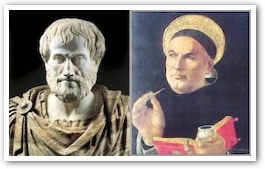What Did Aristotle Think Was The Difference Between Humans And Other Animals?
An piece of cake but accurate way of distinguishing the ethics of Aristotle from that of Aquinas lies in examining the fundamental questions they ask.

Aristotle'south ethics is the protracted answer to 3 basic questions:
(1) Who am I? (two) How should I alive? (3) Where am I going?
To these questions, Aristotle responds by explaining that nosotros are social beings; that we should live a life of virtue in accord with reason; and that our end is happiness.
Aristotle'due south ethics is very sensible. He elaborates on the fact that we are social beings who, if we are to achieve happiness, must be reasonable and live a life of virtue. If there is a flaw or weakness in this scheme, it is because Aristotle assigns reason far more prominence than love. Nosotros know that a cunning person who is not concerned about behaving ethically tin can apply reason in ways that are not virtuous. Reason, then, does not guarantee virtue.
Aquinas asks four questions:
(ane) Who am I? (2) What should I do? (three) How tin I do what I should do? (4) Where am I going?
Aquinas answers the first question, in effect, by explaining that nosotros are simultaneously unique individuals every bit well every bit socially responsible beings. In a word, nosotros are persons. What nosotros should exercise, essentially, is love. The manner we express dear is through virtue. If we are bereft of virtue, we are unable to express honey. Finally, our destiny is happiness (approbation) that begins in this world, but is consummated with God.
The difference between the ethics of Aristotle and Aquinas has to exercise with how virtue comes about. It is reasonable to be virtuous. Surely "honesty is the all-time policy." That is just a reasonable statement that does not require honey. And virtue, for Aristotle, lies between 2 extremes. Thus, the virtue of courage, for example, is the midpoint between the vices of timidity and foolishness. This is all very sensible, though something is missing.
Maybe Aristotle overestimated our capacity to be reasonable and under-estimated the importance of beloved. Whereas Aristotle links virtue to reason, Aquinas links information technology more than properly to love. Therefore, equally the Angelic doctor states, "Love is the form of all virtues." This means that every virtue derives its degree of virtuousness by its association with beloved.
In his book The 4 Loves, C. S. Lewis refers to a poem entitled, "Beloved Is Enough" and the critic who is said to have responded to it by stating, tersely, "It isn't." Just as virtue needs love as its root, dear needs virtue for its mode of expression. Aquinas asked and responded to the cadre question that Aristotle tended to ignore: "How can I be virtuous (since reason does not always directly me to what is skilful)?"
Aristotle had the right outline, but Aquinas filled in a disquisitional gap. The Christian attitude seems more realistic than the pagan one. St. Paul tells u.s.a. how he agonized over the fact that he was neglectful in doing what he should do and guilty of doing the evil he knew he should avert. Nosotros read in Matthew 26: 41, "Watch and pray then that you volition not autumn into temptation. The spirit is willing, but the flesh is weak." We need not only love, but grace, too, in society to exist virtuous.
A handy style of putting it is that love for others evolves in three stages: considerateness, appreciation, and affection.
Many of today's cocky-help books go along from the assumption that information technology is reasonable to practice the virtuous thing and unreasonable to do the opposite. But rational homo does not become virtuous by reading a book, though a book might gear up him on the correct path. He becomes virtuous when he is able to love.
This leads to an additional question: "How do we find love?" Kickoff, nosotros possess beloved because we are made in the image of a loving God. Therefore, we are capable of love. Love becomes animated when we perceive the expert of others and desire to protect and promote that skillful. Turning from our concerns virtually ourselves and looking at the needs of others is an effective means of animating our dear, bringing information technology out of dormancy, and preparing it for virtuous expression.
A handy way of putting it is that love for others evolves in three stages: attentiveness, appreciation, and affection.
First, we pay attention to the other person and discern who he is and what is affecting him. When nosotros do this, we begin to develop empathy and a regard for the value of the other person. Finally, nosotros express affection for the person in a proper way. An encouraging word or a pat on the back or a helpful proffer are all practiced examples of affection. Love between married man and wife represents a paradigm for expressing affection.
Love should not exist as hard every bit we oft make it out to be. We are persons chosen to love others and express our love finer and properly through virtue. If we can practice this, we are well on the way to happiness, even though happiness is not our principal goal.
Source: https://www.catholiceducation.org/en/religion-and-philosophy/philosophy/aristotle-and-aquinas-the-vital-difference.html
Posted by: larosasupponed1981.blogspot.com

0 Response to "What Did Aristotle Think Was The Difference Between Humans And Other Animals?"
Post a Comment